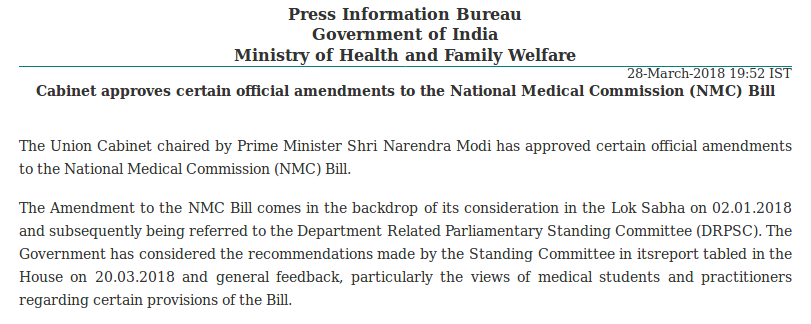NMC Bill: Cabinet approves National Exit Test, 50% fee regulation in private colleges
Somesh S Menon | March 29, 2018 | 12:46 PM IST | 4 mins read

NEW DELHI, MARCH 28: The Union Cabinet has approved certain amendments in the National Medical Commission (NMC) Bill as per which a National Exit Test (NEXT) may soon be introduced as a mandatory licentiate exam only after clearing which MBBS students will be allowed to practise.
The NMC Bill, first presented before the Cabinet in December 2017, promises to bring about important changes to the way medical education is administered in India and the amendments passed by the Cabinet on March 28, 2018, reflect the Centre’s determination to put it in motion at the earliest.
Important amendments introduced
As per the current structure, MBBS students need to complete their course, undergo the mandatory internship and get registered with the Medical Council of India (MCI) or a State Medical Council (SMC) before being allowed to practise. The proposed introduction of NEXT, which will basically be the final MBBS examination for medical students rather than an additional separate licentiate exam, is being done with the intention of ensuring only meritorious students are allowed to practise.
Apart from this, a controversial provision in the NMC Bill which would allow AYUSH (Ayurveda, Yoga and Naturopathy, Unani, Siddha and Homoeopathy) students to practise modern medicine after undertaking a bridge course has been removed. Fees charged by private medical colleges at both undergraduate and postgraduate level will also be regulated for upto 50% seats, rather than the 40% seats which were initially proposed, once the Bill comes into force.
Amendments to the NMC Bill had first been considered by the Lok Sabha on February 2, 2018, and subsequently on March 20, 2018, after being presented by the Department Related Parliamentary Standing Committee (DRPSC) which had worked on its conception. After considering the feedback received from the Lower House and the views of medical students and practitioners, the Union Cabinet chaired by Prime Minister Narendra Modi has finally given the go-ahead for the modified version of the Bill to be passed.
While it remains unclear what the Cabinet’s stance is on the NMC replacing the Medical Council of India (MCI), one of the biggest recommendations made in the original draft of the Bill, the amendments as currently approved by it still indicate a major shake-up of the medical education structure in the country is going to be soon underway.
Details on the amendments

As per the press release dated March 28, 2018, and issued by the Ministry of Health and Family Welfare in this regard, the amendments include -
-
Final MBBS exam will serve as NEXT
-
The final MBBS exam, which will be commonly held across the country, will serve as the new criteria for determining whether MBBS students will be given a license and allowed to practise. NEXT will also replace the Foreign Medical Graduates Examination (FMGE) and serve as the screening cum entrance test for doctors who have studied abroad to practise or study further in India.
-
-
Bridge course for AYUSH practitioners scrapped
-
One of the recommendations of the NMC Bill which had received severe flak from MBBS students was regarding the introduction of a Bridge Course for AYUSH practitioners which would allow them to practise modern medicine as a way to increase the number of doctors and improve the provision of healthcare in rural areas. As decided by the Cabinet, it will now be upto State Governments to take alternative measures to address the issue of medical healthcare provision.
-
-
Fees to be regulated in private medical colleges and Deemed Universities
-
A move which is likely to be welcomed by all medical students is regarding the regulation of fees charged by private medical colleges and Deemed Universities. As per the original draft of the NMC Bill, 40% of the seats in these institutions would be subject to fee regulation. Now, as per the amendments, this has been increased to 50%, inclusive of academic fees and all other charges.
-
-
States and Union Terrotories to have 6 representatives
-
The National Medical Commission, the 25-member body which will be formed for medical education regulation following the full implementation of the Bill, was initially supposed to comprise three representatives each from all states and UTs. This has now been increased to six representatives following the demands received from the states and UTs.
-
-
Penalty options increased for non-compliant colleges
-
The initial NMC Bill only allowed for monetary penalty, ranging from one half to ten times the annual fee received from any particular batch of students, to be charged on colleges which violated any norms or regulations. This clause has now been replaced by a stronger one which allows for different penalty options to be enforced, including non-monetary ones such as reduction of intake or even withdrawal of recognition.
-
-
Harsher punishment for quacks or unqualified practitioners
-
In a move to safeguard the quality of healthcare in the country, the Cabinet has also decided to enforce harsher punishments on unqualified or illegal medical practitioners and quacks through the NMC Bill. The punishment can now constitute imprisonment of upto one year along with a fine of upto Rs. 5 lakh on those found violating rules.
-
As was reported by Careers360 in December 2017, the NMC Bill is the outcome of a process which was in the works for three years, and involved the inputs of multiple Government bodies and committees, most importantly the Niti Aayog.
Follow us for the latest education news on colleges and universities, admission, courses, exams, research, education policies, study abroad and more..
To get in touch, write to us at news@careers360.com.